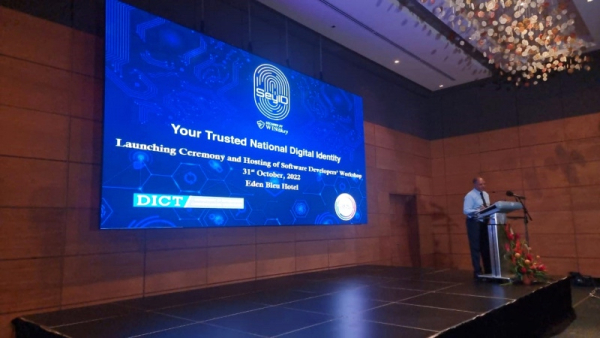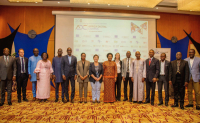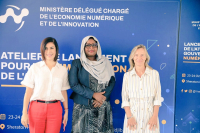
Public Management (581)
In Africa, the coronavirus pandemic has accelerated the development of the e-commerce sector. The development calls for better structuring to streamline the sector and make it more efficient.
Lome will host a national e-commerce seminar from November 10 to 11, 2022. The seminar initiated by the Togolese Ministry of Trade is being organized in partnership with the World Trade Organization (WTO).
It aims to teach young Togolese entrepreneurs how to use new online marketing platforms amid the current acceleration of digital transformations and the rise of the e-commerce sector, which is presented as a major opportunity for economic actors.
New businesses are invited to register their interest in the seminar before November 7. According to the Ministry of Trade, women-led businesses are strongly encouraged to register.
Let’s note that a similar seminar is organized for actors in the textile sector, on the sidelines of the International Exhibition of African Textiles (SITA2022), being held in Lome (November 4 to 6, 2022).
Ayi Renaud Dossavi
In August 2021, Seychelles decided to accelerate its digital transformation for an efficient digital economy. The platform is one of the results of the strategy implemented in that regard.
Seychelles inaugurated, last Monday, "SeyID," its national digital identity platform. According to Vice President Ahmed Afif (photo), the new platform is one of the initiatives carried out by the Department of Information and Communication Technology (DICT) to accelerate the country's digital transformation.
"Having a digital ID through the SeyID platform will not only be a means of proving your identity digitally or accessing digital public or private services. It will also allow you to digitally sign documents, another growing requirement when transacting digitally. Through this platform, digital signing will be far much easier to do compared to what is the case presently,” he said.
According to the World Bank, in 2020, Seychelles’s GDP dropped to a negative 13.5%, due to the coronavirus pandemic, which disrupted economic activities. In February 2021, to diversify and expand its economy, the country announced plans to accelerate its digital transformation. SeyID is one of the results of that plan.
The platform is developed by WISeKey International Holding, a Swiss cybersecurity firm. It will give Seychellois the tools they need to prove their identity online, but it will also facilitate access to many public and private services that choose to integrate with the SeyID platform thanks to interconnecting application programming interfaces (APIs).
The SeyID app is already available on the Play Store. According to Finance Minister Naadir Hassan, “the SeyID platform is based on WISeKey’s WISeID platform which guarantees a high level of Digital Identity and online security.”
It “will be accessible through both web-based and mobile-based applications and both are supported with strong authentication techniques. This is to ensure the security of the SeyID platform users,” he added.
Samira Njoya
The new director general was appointed to save the public postal company from its various woes.
Senegal’s public postal company “La Poste” will undergo an extensive digital transformation in the coming months, new director Mohamadou Diaïté indicates.
According to the director general, who assumed office last Monday, digital transformation is one of the priorities of the "Strategic Plan for the Expansion of the Post (PSE-P)." The said plan includes actions like the modernization of the company’s logistics, the development of electronic banking and e-commerce, and the addition of innovative financial services.
"It is not conceivable that in 2022 we will still be issuing manual receipts. We need to diversify our products and make up for our lateness to ensure improved profitability,” he said.
In recent years, the national postal company has faced several issues affecting its operations. The issues include low-tech tools integration and poor management of customers’ new ICT needs.
To address the various issues identified, in 2021, the posts and telecommunication regulator ARPT organized a workshop for the development of a new strategy that would modernize the postal sector. The strategy focuses on four areas, including the promotion and use of ICTs to improve the overall performance of the sector.
Mohamadou Diaïté wants to ensure the continuity of the actions suggested. He plans to address the issues by "judiciously exploiting the objective and scalable opportunities presented by the" national postal company. For that purpose, an institutional transformation is needed to create a postal bank, he explained. He added that there is a need to accelerate digital transformation, diversify products and services to cover a broader range and introduce more innovation by strengthening and modernizing logistics, electronic banking, and e-commerce
Samira Njoya
Computers and smartphones are undoubtedly useful in our daily lives. However, their excessive use can have negative impacts on users’ physical and mental health. It can also negatively affect children’s psychosocial development. To prevent those consequences, Gabon is implementing awareness-raising actions.
Gabon will launch a national digital awareness campaign in the coming months. In a prelude to that campaign, last Friday, it organized a conference under the theme: "The dangers of overexposure to screens: impacts on behavior and health." The national campaign, initiated by consulting agency Blanc Cristal and the rehabilitation center Mot à Mot, is organized thanks to the Ministry of Digital Economy’s support.
According to Virginie Mounanga, CEO of Blanc Cristal, it aims to alert parents on the dangers of overexposure to the Internet and screens. "We have met with several doctors, specialists, and school principals who complain about children and adolescents being addicted to the Internet, cutting themselves off social activities [...] and affecting school performance. So, we need to alert parents and educators of the dangers, allowing them to mitigate those impacts,” she explained.
Gabon, like many African countries, adopted digital technologies to keep socio-economic activities going during the coronavirus pandemic. The pandemic changed internet consumption habits, boosting demand for connectivity. Consequently, the average time spent in front of screens has risen sharply. This caused several health (myopia, sedentarization), behavioral (sleep and mood disorders), and social (language delays, attention disorders, and school difficulties) problems.
According to the professionals who took part in the conference, some measures need to be taken to address the problems. They include limiting internet time, turning off Wi-Fi intermittently, and developing social and family activities.
They also mentioned the Canadian method of limiting screen time for children. According to the specialists, it involves forbidding screens to children before the age of 2 and monitoring usage time for those older than 2.
Samira Njoya
The African digital economy is a promising sector that is expected to be worth US$712 billion by 2050, or 8.5% of continental GDP. To capitalize on its dividends, several countries are implementing digital transformation strategies. Some of them, including Côte d’Ivoire, have accelerated their plans, after the coronavirus pandemic.
Côte d’Ivoire needs more than XOF2 trillion (US$3 billion) to complete its digital infrastructure program, Digital Minister Amadou Coulibaly indicated last Friday. The official presented the estimate during a plenary session around the theme "Investing in Côte d'Ivoire", at the 10th edition of the CGECI Academy organized by the General Confederation of Enterprises of Côte d'Ivoire (CGECI) - Patronat Ivoirien.
The program includes the construction of the National Data Center and the completion of the national backbone. The two projects, slated for completion in 2025, will complement the others planned under the national digital development strategy and support economic development.
The data center will bring together, in one secure location, all the public services that the government is currently dematerializing, therefore ensuring their efficiency. As for the national backbone, it will help provide cheaper broadband -an essential requirement for enhancing access to dematerialized services and socio-economic opportunities- to every household.
According to Minister Amadou Coulibaly, a National Digitalization Committee will be set up to coordinate digital development activities. He added that the Prime Minister would launch the committee’s activities in the coming months.
The projects mentioned are part of the 2025 digital strategy developed under the Ministry of Digital Economy’s lead and adopted during the December 22, 2021, Ministerial council. The strategy suggested 32 reforms and 96 projects to be implemented over the 2021-2025 period. Its indicative budget is XOF2 trillion.
According to the World Bank, Côte d’Ivoire could generate over US$5.5 billion and US$20 billion from the digital economy respectively by 2025 and 2050 if the strategy is effectively implemented.
Samira Njoya
A few years ago, the Republic of Congo kicked off its digital transformation plan. However, several areas are still left out of the benefits of those digital transformation projects because they are not yet to be fully connected to the internet.
UNESCO and Congolese authorities will carry out the first study on universal internet access in the country. The study was announced, last Monday, by Fatoumata Barry Marega (photo, left), UNESCO resident representative, during an audience with Leon Juste Ibombo (photo, right), the Congolese Minister of Posts, Telecommunications and Digital Economy.
"In just a year, the Republic of Congo gained twenty-six points in the ranking of countries that facilitate access to digital technologies. The progress is due to the digital transition, which is one of the priorities of the 2022-2026 National Development Plan," said Fatoumata Barry Marega.
In recent years, the country has taken several actions to advance its digital transformation and internet coverage. According to the latest DataReportal report published in February, Congo's Internet penetration rate was 25.4% in early 2022. Kepios' analysis indicates that, in Congo, the number of Internet users increased by 276,000 (+23.4%) between 2021 and 2022. This means that 4.27 million people were still not using the internet in the country at the time.
The study announced by UNESCO could begin in November. It aims to understand and assess the complexity of internet growth and its impact on the country’s development. It will also allow a proper diagnosis and suggest adequate solutions to solve the territorial digital divide and allow everyone to have access to the internet in Congo.
During the audience with Minister Leon Juste Ibombo, the UNESCO resident representative also announced several other digital projects to be carried out in partnership with Congo. They include a program aimed at introducing students to coding and artificial intelligence and the project to create the first digital educational TV in Congo.
The projects are part of the National Strategy for the Development of the Digital Economy called Congo Digital 2025. It aims to ensure that everyone can reap the benefit of digital progress in the country. “To achieve that ambition, we must ensure the national territory is fully covered,” said Leon Juste Ibombo in 2019 at the launch of the Congo Digital Strategy.
Samira Njoya
Many African countries have embraced remote education to address the challenges related to education in their education systems. However, the unavailability of infrastructure and advanced services that would enable easy access to remote learning remain major issues.
On Tuesday, October 25, Benin officially launched the Africa digital Campus project. The consortium agreement for the implementation of this project was signed by the Institute of Research for Development (IRD), the Agence Universitaire de la Francophonie (AUF), the French Development Agency (AFD), the Virtual University of Burkina Faso and the Agency for Information Systems and Digital (ASIN).
The project, funded by AFD and carried out by IRD and the West and Central African Research and Education Network (WACREN) in partnership with the AUF, aims to promote the continuity and quality of higher education in West Africa by improving local universities’ network infrastructure and e-learning offering.
"In its pilot phase, the Africa Digital Campus project will allow the deployment of distance learning by strengthening the e-learning offer of two universities in West Africa: the Virtual University of Burkina Faso (UVBF) and the National Institute of Industrial Technology of Lokossa (INSTI), Benin,” the Beninese government explains.
The two-year project will strengthen the online training offer, the development of digital infrastructure, and access to connectivity within the two targeted higher education institutions in a post-Covid-19 context.
It is in line with the Beninese government’s plan to develop digital technologies to improve higher education. It will impact a thousand students in the country. The project complements government initiatives such as the Beninese Education and Research Network (RBER). In its pilot phase, the RBER allowed the interconnection of ten universities with services such as connectivity, IP telephony, and videoconferencing; and the e-Learning project, in its pilot phase.
Samira Njoya
The D4D project is part of the Horn of Africa Initiative, which aims to identify common cybersecurity and public services digitalization challenges in the Horn of Africa.
Four international institutions recently launched the program Digital for Development ( D4D), which aims to support the digital transformation of countries in the Horn of Africa, in Djibouti. They are namely the European Union, Expertise France (EF), GIZ, and the International and Ibero-American Foundation for Administration and Public Policies (FIIAPP).
The training workshop on the first pillar of its roadmap (Djibouti Smart Nation) began on Sunday, October 23 in Djibouti under the guidance of Minister Delegate in charge of Digital Economy and Innovation Mariam Hamadou (photo, center), and the EU Head of Cooperation in Djibouti, Simona Schlede (photo, right).
“This workshop will provide an opportunity to present the #GovStack approach, the European initiative that helps public administrations build their digital infrastructure networks based on an approach prioritizing and classifying services in interoperable blocks,” reads a Tweet by the European Union’s delegation in Djibouti.
“GovStack building blocks include software components such as security, registration, authentication, digital payments, digital identity, shared data repositories, content management, and data collection,” Mariam Hamadou explained.
The D4D is a 3-year program with an €11 million budget (€10 million will be provided by the European Commission and €1 million by the German Federal Ministry of Economic Cooperation and Development-BMZ). It will benefit three countries, namely, Djibouti, Kenya, and Somalia. It will enable the beneficiaries to undertake the first strategic, institutional, regulatory and humanitarian steps necessary to establish digital government services that can boost regional harmony. It also focuses on cybersecurity reinforcement.
Ten directorates from various Djiboutian institutions have taken part in the workshop. They include the Single Window, the Central Purchasing Center for Essential Medicines and Medical Consumables (CAME), and the Ministry of Labor.
The D4D program is part of the Horn of Africa Initiative launched in October 2019 by the governments of Djibouti, Ethiopia, Eritrea, Kenya, and Somalia. It aims to identify and harmonize approaches to addressing the region's common cybersecurity and public service digitization challenges.
Samira Njoya
To successfully implement its 2025 strategic development plan, Gabon is multiplying partnerships to attract investors.
Last Tuesday, Gabon signed a partnership agreement with Asoko Insight to develop virtual DealRoom. The agreement was signed by the Minister of Investment Promotion Hugues Mbadinga Madiya, and Rob Withagen, co-founder and CEO of Asoko Insight two days after the flag-raising ceremony marking Gabon’s entry into the Commonwealth.
The digital platform aims to promote the influx of investments by providing national and international investors with an effective tool for business networking.
“[...] The launch of this digital platform sends a strong signal to investors. […] “it is an innovative partnership for our country. The acquisition of this digital tool makes it possible to promote investments and gives greater visibility to investment projects. It also allows for fluidity of information in terms of programs, reforms, and opportunities, as well as data on the profile of investors,” said Minister Mbadinga Madiya.
Gabon is a secure business environment that provides access to a regional market of 180 million consumers. It presents business opportunities in the energy, health, education, timber, fisheries, agriculture, and services sectors. In 2019, Forbes ranked the country as the 37th and 147th best country for business respectively in Africa and in the World.
The platform is expected to promote investment, give greater visibility to investment projects, and allow a great flow of information on programs, reforms, opportunities, and data.
It “will result in a faster investment process, which will have the advantage of building Gabon’s reputation as a business destination and of increasing the flow of FDI in Gabon,” the Investment Minister added.
Samira Njoya
By partnering with Pando DAO, Zanzibar wants to maximize its chances of becoming a leading industrial hub in Africa and a model of the digital economy.
Pando DAO, an African community of leading start-up founders, announced, Monday (October 17), its partnership with Silicon Zanzibar, a government initiative launched earlier this year to attract tech talents and companies.
According to Mudrick Soraga, Zanzibar's Minister of Investment and Economic Development, the partnership is important to ensure the success of the Silicon Zanzibar project. "We are excited to officially partner with Pando to co-create the policies and initiatives that will transform Zanzibar’s economy. Working with Pando DAO presents us an opportunity to work side-by-side with the leading players in the African tech ecosystem,” he said.
The first initiatives of the partnership will include the creation of an open hub for Pando DAO members and a Pando CEO Summit, which will be launched later this year. The community will also assist the Zanzibar government in developing a regulatory and policy framework that will support innovation and its digital economy, including a strategy to ensure the development of local tech talent.
The partnership with Pando DAO is highly beneficial for Zanzibar which wants to become a leading hub for pan-African tech companies. Indeed, through Pando Dao, the government is partnering with over 50 African tech startup founders, including founders of well-known startups like mPharma, Wasoko, Pariti, SunCulture, and Africa Health Holdings among others. The overall valuation of Pando DAO’s member startups is over US$2 billion with more than US$500 million raised. The startups employ over 10,000 people in 15 African countries.
According to Pando DAO co-founder and Pariti CEO Yacob Berhane, Pando DAO member companies will be supported, by the government, in their efforts to relocate to the archipelago. “We believe that through this partnership, we will be able to drive the tech ecosystem in Africa forward, with Zanzibar serving as a key part of that story by attracting tech companies and talent, and developing homegrown companies and talent as well,” he said.
Samira Njoya
More...
Gabon is currently implementing several e-learning projects to empower learners and facilitate distance learning.
Gabon recently crossed a new milestone in its digital university project UNG. Last October 13, the draft law on its creation, missions, and management was adopted during the Ministerial Council in Libreville.
According to a communique published after the council, the UNG will develop and popularize digitalization in the Gabonese education system. It will also support higher education and research institutions in the development of online training courses -the creation of digital education material notably- and promote entrepreneurship and digital innovation.
In Gabon, as almost everywhere in the world, the education system was disrupted by the coronavirus pandemic. The country quickly adopted new approaches by mostly including digital tools. The UNG will therefore set up digital spaces functioning like regional academic centers dedicated to blended university learning (distance and physical learning) in provincial capitals.
On its website, the UNG informs that its training is partially remote. It has a platform that allows students to access educational resources and online documentation, but also webinars and digital workspaces. Face-to-face meetings are scheduled for tutorials, assessments, and socialization.
The three-year training program will give graduates the opportunity to work in a wide range of e-services professions. Every UNG student will take an entrepreneurship course with insertion in e-incubators, to boost their ability to create innovative companies for socio-economic development.
Samira Njoya
The Algerian government has decided to leverage digital technologies to solve the country's transport issues. Last month, the Minister of Transport announced the launch of a new electronic platform interconnecting more than 40 public transport services.
Algeria’s Minister of Higher Education Kamel Baddari announced, yesterday, the launch of “MyBus”, a mobile app developed to allow students to monitor the university transport network in real-time.
The application -operational starting from October 23, 2022,- is a modern tool that aims “to improve the quality of university services [...] to create a conducive academic environment for students,” the Transport Minister said before the national assembly’s transport committee.
Since 2009, students have been complaining about mobility conditions, including disruption in university bus schedules and a serious lack of buses in some areas. Last April, a group of students enrolled at the University of Mouloud-Mammeri demanded the allocation of buses to resolve a crisis that has affected students for years.
With “Mybus”, the Ministry of Higher Education is trying to address some of the challenges pointed out, notably concerning the mobility of students living in rural areas. Initially, the app will cover ten routes and 26 buses out of the 5,749 dedicated to academic mobility. But, according to Minister Baddari, it will cover the whole university network before the end of the ongoing academic year.
“The app will give students [schooling in Algerian Universities] a real-time overview of the academic transport network and schedules,” he explained.
The new app is in line with authorities’ efforts to modernize the academic mobility sector to improve students’ living conditions and reduce public expenditures in that segment.
Samira Njoya
The platform is the result of important reforms announced by the government earlier this year.
Last Friday, Niger launched its national portal for unified access to digital educational resources. The platform, dubbed Edu-Niger, was inaugurated by the Minister of National Education, Prof. Ibrahim Natatou (photo, center). It aims to improve the quality of education and enhance planning and management.
According to Prof. Ibrahim Natatou, this major platform is one of the digital projects already undertaken by the government. "The portal integrates an intranet messaging system and also allows users to request leaves or permissions without [wasting time] going from one office to another with the [written] request,” he said.
"Edu-Niger" was set up to correct certain flaws in the education system such as the lack of information and reliable statistics on the sector, slow administrative procedures, and the lack of communication between actors, partners, and parents. It offers several services allowing parties to complete processes to create public and private schools, transfer students from one school to another, create school canteens or take part in two public examinations (BEPC and BAC).
Its library open to the public allows access to educational resources (annals, tests, vignettes, various exercises, capsules, guided tours, etc), and administrative resources (communiqués, decrees, decisions, etc.).
The platform is a result of the Niger-LIRE project (Learning improvement for results in education), an initiative of the Nigerien government financed by the World Bank to the tune of US$140 million. It is part of the overall strategy to digitalize the whole education system.
Samira Njoya
To increase economic activity in the country, and revive its Covid-19-affected tourism sector, the Namibian government will implement a new initiative to attract professionals.
Last week, the Namibia Investment Promotion and Development Board (NIPDB) launched the Namibian Digital Nomads Visa (DNV) to welcome “smart tourists” to the country. The move aims to capitalize on the country’s digital assets to boost the tourism sector, which contributed 61.3% to GDP since August 2022.
Speaking at the launch of the Visa, Nangula Uaandja, CEO and chairperson of the Namibia Investment Promotion and Development Board, said the new visa aims to unlock opportunities that will improve the population’s living conditions. "We have identified that there is an opportunity to attract and gain economic benefit from people who want to work, live and travel in Namibia, without absorbing Namibian jobs," he said.
The Namibian visa for digital nomads is valid for six months and can be granted to any national or international individual. According to the NIPDB, applicants must meet several criteria, including proving their monthly income is equal to or exceeds US$2,000 and justifying health or travel insurance to cover risks during their stay in Namibia.
The country's other digital assets are clustered in a digital ecosystem conducive to remote work, although Internet costs are still very high in Namibia. In its report "Worldwide mobile data pricing 2021. The cost of 1GB of mobile data in 230 countries," Cable.co.uk ranks Namibia 49th in sub-Saharan Africa estimating that 1 gigabit (GB) costs US$22.37 in the country.
According to DataReportal, Namibia’s internet penetration was 51.0% in early 2022. “Ookla’s data reveals that the median mobile internet connection speed in Namibia increased by 5.91 Mbps (+42.3 percent) in the twelve months to the start of 2022,” it adds.
In addition, Namibia has a high e-government development index (HEGDI) and is ranked the 6th African country with the highest level of public service digitization.
By launching this initiative, Namibia becomes the 4th country in Africa to offer this special visa after Mauritius, Seychelles, and Cabo Verde. According to 2021 statistics from "A Brother Abroad", there are about 35 million digital nomads in the world, representing a global economic value of US$787 billion.
Samira Njoya















